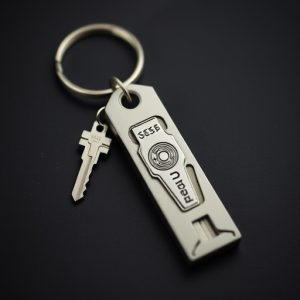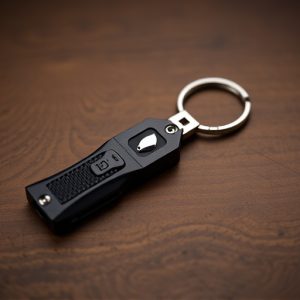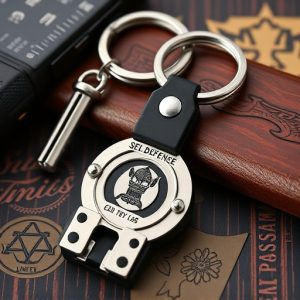Military Grade Keychain Safety: Legal Requirements & Compliance Check
Military-grade keychain defense tools offer powerful self-defense in a compact form, but their legal…….
Military-grade keychain defense tools offer powerful self-defense in a compact form, but their legality varies globally. Users must research local regulations, as these tools often fall under strict rules due to potential impact and force capabilities. Understanding regional disparities is vital for compliance, public safety, and avoiding legal issues. A meticulous process involving evaluating tool criteria, consulting authorities, and staying informed on legislative changes ensures legal deployment of military-grade keychains.
Staying safe while on the go is paramount, and military-grade keychain defense tools offer a compact solution. However, before you invest, understanding the legal landscape surrounding these devices is crucial. This guide delves into the regulations governing their use, highlighting regional variations and the significance of military-grade standards. By following our step-by-step compliance checklist, ensure your chosen keychain defense tool adheres to legal requirements, empowering you with peace of mind and personal safety.
- Understanding Legal Landscape for Keychain Defense Tools
- Military Grade Standards and Their Relevance
- Regional Variations in Legislation
- Ensuring Compliance: A Step-by-Step Guide
Understanding Legal Landscape for Keychain Defense Tools
In the realm of personal safety, especially for those who lead active lifestyles or work in high-risk environments, keychain defense tools have emerged as a popular choice. These compact and convenient devices, often attached to keys, serve as a quick line of defense against potential threats. When it comes to understanding the legal aspects of such tools, the landscape can be intricate. Various factors come into play, particularly when considering military-grade keychain defense tools, which are designed with robust protection in mind.
Different jurisdictions have distinct regulations regarding self-defense weapons, including keychain gadgets. Some countries and states have specific laws governing the carrying and use of personal defense devices, such as restrictions on certain types of force or requirements for permits. Military-grade tools, due to their potential for high impact and strength, might fall under stricter regulations, emphasizing the importance of local legal research before acquiring such a device.
Military Grade Standards and Their Relevance
Military-grade standards play a crucial role in ensuring the effectiveness and reliability of keychain defense tools. These tools are designed to provide individuals with a quick and accessible means of self-defense, especially when traveling or in emergency situations. When a keychain defense device meets military-grade criteria, it signifies that it has undergone rigorous testing and adheres to strict performance standards.
The relevance lies in the fact that military-grade keychain defense tools are built to withstand extreme conditions and offer consistent protection. They often incorporate features such as sharp blades, durable construction, and reliable locking mechanisms, ensuring users can defend themselves with confidence. Such tools are particularly valuable for individuals who frequently find themselves in potentially dangerous situations or those seeking added peace of mind when carrying a compact self-defense device.
Regional Variations in Legislation
Regional variations in legislation can significantly impact the availability and use of military-grade keychain defense tools. What’s considered legal in one country or state may be prohibited or have strict regulations in another, making it essential for travelers and locals alike to familiarize themselves with local laws before acquiring such devices. This is especially crucial when it comes to self-defense tools designed for keychains, as they often raise concerns about public safety and potential misuse.
For instance, some regions may permit only certain types of self-defense mechanisms, focusing on non-lethal options while banning or restricting deadly force devices. Others might have stringent requirements for the carry and use of any personal defense tools, including military-grade keychains. Understanding these regional differences is vital to ensure compliance with the law, promote public safety, and avoid legal repercussions when traveling or purchasing such items.
Ensuring Compliance: A Step-by-Step Guide
Ensuring compliance with legal requirements for a military-grade keychain defense tool involves a systematic approach. Begin by thoroughly researching your region’s specific laws and regulations related to personal defense devices, focusing on keychains. This includes understanding the allowed types of self-defense tools, their maximum force capabilities, and any registration or licensing mandates. Next, carefully evaluate your chosen keychain defense tool against these criteria. Ensure it meets or exceeds safety standards by examining its design, materials used, and manufacturing processes. Look for certifications that validate its effectiveness as a military-grade defense solution.
A step-by-step guide includes checking local police departments or relevant government agencies for updated guidelines, comparing the tool’s specifications against industry-recognized safety benchmarks, and consulting with legal experts to confirm compliance. Regularly review changes in legislation to stay current on any new requirements. By following these measures, users can confidently deploy military-grade keychain defense tools while adhering to the law, enhancing personal security without legal repercussions.
When it comes to choosing a keychain safety device, understanding the legal requirements is paramount. The article has navigated the intricate landscape of regulations surrounding military-grade keychain defense tools, highlighting regional variations and the importance of compliance. By adhering to the step-by-step guide provided, individuals can ensure their chosen self-defense accessory meets stringent standards while navigating the complexities of local laws. Investing in a military-grade keychain defense tool is not just about personal safety; it’s about making an informed decision that respects legal boundaries and fosters a secure environment.


